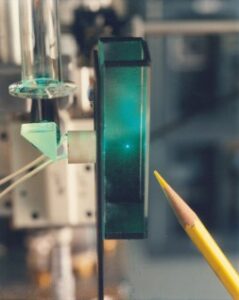
More than 80% of physicists believe that the UK will fail to meet its 2050 “net-zero” targets, according to a report released today by the Institute of Physics (IOP), which publishes Physics World. It says “we stand at a crossroads” regarding climate change, with more support needed to tackle what the IOP calls “the defining challenge of our time”. Alok Sharma, the physicist who was president of the United Nations COP 26 conference in Glasgow in 2021, says in the report that physics research and innovation is “central” to the energy transition.
The UK government committed back in 2019 to reaching net zero by 2050, following a recommendation by the Climate Change Committee, the UK’s independent climate advisory body. This pledge, which is a legal requirement, would require reducing the country to cut its greenhouse-gas emissions by 100% from 1990 levels by 2050. If met, this would mean the amount of greenhouse-gas emissions produced by the UK would be equal to or less than the emissions removed by the UK from the environment.
The IOP’s report – Physics Powering the Green Economy – sets out the role that physics and physicists can play in fostering the green economy. Indeed, since 2005, some 70% of the £2.2bn that has been spent by the UK Research and Innovation – the umbrella organisation for the UK’s research councils – on green energy has gone on physics-based technologies such as nuclear, renewable energy, energy storage, hydrogen and alternative fuels as well as carbon capture and storage.
Yet the report says that the UK will need more investment and support if the country is to get back on track to meet its climate goals. That conclusion is echoed by the IOP’s survey of 502 physicists working in academia, business and research, 83% of whom think that the UK will miss the net-zero target with 68% believing that the current level of investment in research and development is too low to guarantee net zero.
Martin Freer a nuclear physicist at the University of Birmingham, who steered the activity on the report, told Physics World that the 83% figure is “really worrying” given that the UK has already taken some steps such as reducing the amount of coal-fired power stations. “The signs are currently pointing in the wrong direction,” adds Freer, who is the IOP’s outgoing vice-president of science and innovation.
Meeting the challenge
The report highlights, however, the many opportunities in the green economy, pointing out that there are already more than 1750 companies working green tech in the UK and Ireland, with a combined turnover of £740bn. A healthy physics ecosystem is “essential” to the continued development of green technologies, says the report, which demands a “broad range” of investments to support physics research as well as business innovation and skills.

Green and novel: the future of energy generation
The IOP also calls for a “systems approach” that, for example, would develop the grid at the same time as pushing forward renewable-energy capacity. Indeed, Freer says the UK government must show “greater ambition” in pushing green technologies. “We need greater investment into research and development,” he adds. “As well as a joined-up approach between different departments in government in terms of their own policies and strategies to make sure they are properly aligned with net zero.”
That view is echoed by Sharma, a former UK business secretary, who is standing down at the next election as a member of the UK parliament. “What is needed in the UK and Ireland is a long term strategic approach – backed by action – an approach which should have physics at its heart,” he says. “This IOP report is timely and provides useful evidence to inform how we can collectively move forward – an important message not just in the UK and Ireland – but across the globe.”
- SEO Powered Content & PR Distribution. Get Amplified Today.
- PlatoData.Network Vertical Generative Ai. Empower Yourself. Access Here.
- PlatoAiStream. Web3 Intelligence. Knowledge Amplified. Access Here.
- PlatoESG. Carbon, CleanTech, Energy, Environment, Solar, Waste Management. Access Here.
- PlatoHealth. Biotech and Clinical Trials Intelligence. Access Here.
- Source: https://physicsworld.com/a/now-is-the-time-for-action-to-reach-net-zero-climate-targets-demands-iop-report/
- :has
- :is
- :not
- 160
- 2005
- 2019
- 2021
- 2050
- 26%
- a
- AC
- Academia
- According
- across
- Action
- activity
- Adds
- advisory
- aligned
- already
- also
- alternative
- amount
- an
- and
- approach
- ARE
- AS
- At
- back
- back on track
- backed
- BE
- been
- believe
- believing
- between
- body
- business
- but
- by
- Calls
- CAN
- Capacity
- capture
- carbon
- challenge
- change
- Climate
- Climate change
- collectively
- combined
- Companies
- conclusion
- continued
- country
- Current
- Currently
- Cut
- defining
- demands
- departments
- develop
- Development
- different
- direction
- down
- echoed
- economy
- ecosystem
- Election
- Emissions
- energy
- Environment
- equal
- evidence
- example
- FAIL
- Figure
- following
- For
- Former
- Forward
- fostering
- from
- fuels
- future
- Future of Energy
- get
- given
- globe
- Goals
- gone
- Government
- greater
- Green
- green energy
- Green Tech
- Grid
- guarantee
- Have
- he
- healthy
- Heart
- highlights
- How
- However
- HTTPS
- hydrogen
- if
- image
- important
- in
- indeed
- independent
- inform
- information
- Innovation
- Institute
- into
- investment
- Investments
- ireland
- issue
- IT
- ITS
- jpg
- just
- Legal
- less
- Level
- levels
- Long
- Low
- make
- many
- max-width
- mean
- Meet
- member
- message
- met
- miss
- more
- move
- move forward
- must
- Nations
- Need
- needed
- net
- net-zero
- next
- novel
- now
- nuclear
- of
- on
- opportunities
- or
- organisation
- our
- out
- own
- parliament
- part
- Physics
- Physics World
- plato
- Plato Data Intelligence
- PlatoData
- Play
- Pledge
- policies
- power
- Powering
- president
- Produced
- properly
- provide
- provides
- Publishes
- Pushing
- reach
- reaching
- Recommendation
- reducing
- regarding
- released
- Removed
- Renewable
- renewable energy
- report
- require
- requirement
- research
- research and development
- research and innovation
- Role
- same
- says
- Science
- secretary
- Sets
- Sharma
- should
- show
- Signs
- since
- skills
- solar
- Solar Power
- some
- space-based
- spent
- stand
- standing
- Stations
- steered
- Steps
- storage
- Strategic
- strategic approach
- strategies
- such
- support
- sure
- Survey
- tackle
- taken
- Target
- targets
- tech
- Technologies
- term
- terms
- than
- that
- The
- The Future
- the UK
- their
- There.
- they
- think
- this
- thumbnail
- time
- timely
- to
- today
- told
- too
- track
- transition
- true
- turnover
- Uk
- UK government
- UK PARLIAMENT
- umbrella
- UN
- university
- View
- was
- we
- WELL
- What
- which
- WHO
- will
- with
- working
- world
- would
- Wrong
- zephyrnet
- zero













